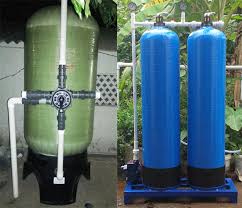
Enhancing Efficiency in Water Treatment with Industrial Sand Filters
Industrial sand filters are essential components in water treatment systems utilized in diverse industries, including municipal water supply, wastewater management, along with industrial operations. Their primary function is to remove suspended solids particulates and contaminants from water, ensuring that it is safe to use. safety of use and discharge. Understanding how Industrial sand filterwork and their benefits can help industries maintain efficient and effective water treatment processes.
How Industrial Sand Filters Work
Water purification sand filter (فیلتر شنی تصفیه آب) using a simple concept: water passes through the sand’s bed which collects and removes dirt and other impurities. The filter is comprised of a tank containing layers of different-sized sand grains. As water flows through the sand bed, larger particles are encapsulated within the upper layers smaller particles are kept deeper in the filter. The water that is clean then flows via an outlet in the central.
**1. Design and Construction:
Sand filters for industrial use are usually constructed of tough materials like cement or steel. The design includes an inlet and outlet system, a distribution system to evenly spread water across the bed of sand, as well as an option to clean or backwash the filter when it is blocked.
**2. Filtration Process:
The filtration process begins when the water enters the tank for filtering and spreading equally across the sand bed. As the water travels through the sand, the impurities are captured and held. Over time the sand bed will become filled with particles, which reduces the efficiency of the filter. To combat this issue the filter is subjected to the process of backwashing. In this, water flows back and forth through the bed of sand to remove the contaminants that have accumulated.
**3. Backwashing:
Backwashing is an important maintenance step for industrial Sand filters. During this process, the water flows in the reverse in the direction of the filter by lifting and agitating the sand. The action releases trapped particles that are then flushed out of the filter. After the backwashing process, the sand bed settles back to its original position and the filter becomes ready to be reused.
Benefits of Industrial Sand Filters
Effective Particle Removal:
Industrial sand filters can eliminate particles as small as 20 microns, which makes them effective for various uses, including municipal water treatment and industrial processes.
Low Operating Costs:
As compared to other filtration techniques Sand filters are relatively low operating and maintenance cost. Their durability and simplicity are the main reasons for their efficiency.
Long Lifespan:
With proper maintenance industrial sand filters will be effective for years. Their robust design ensures they can withstand heavy usage and extreme conditions.
Environmentally Friendly:
Sand filters utilize natural media, which is greener than synthetic filters. They also require fewer chemicals to maintain them, thus reducing impacts on the environment.
Conclusion
Industrial sand filters are vital in ensuring the purity and security of the water in different applications. Their efficient filtration, cost-effectiveness, and durability are the main reasons why they are a popular choice for many industries. Regular maintenance, such as backwashing, ensures that these filters will continue to function at their best, providing clean, high-quality water for various uses.




